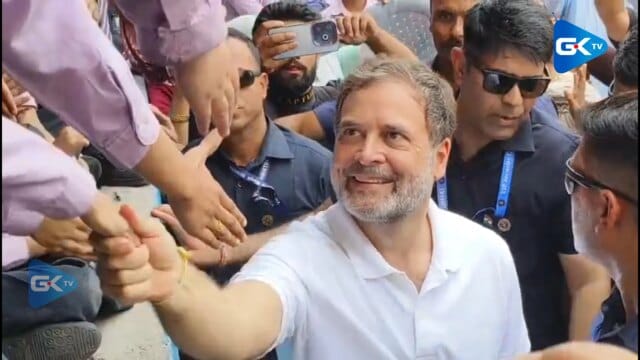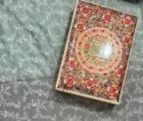Rajouri, May 24: In a powerful gesture of solidarity and empathy, Leader of Opposition (LoP) in the Lok Sabha Rahul Gandhi Saturday visited the Poonch district of Pir Panjal region to assess the devastation caused by the recent cross-border shelling.
His visit, marked by emotional encounters, ground assessments, and interfaith outreach, comes at a time when residents of the region continue to reel under fear and trauma following days of intense shelling from across the Line of Control (LoC).
Rahul Gandhi, who arrived in Jammu on Saturday morning, was received by J&K cabinet minister Javed Rana before proceeding to Poonch by helicopter.
Upon his arrival in Poonch, he was welcomed by senior Congress leaders, including Jammu and Kashmir Pradesh Congress Committee (JKPCC) President Tariq Hameed Karra, and other top brass including All India Congress Committee (AICC) General Secretary Syed Naseer Hussain, Ghulam Ahmad Mir, and former ministers Vikar Rasool Wani and Chaudhary Lal Singh.
Gandhi first met with families who lost their loved ones in the Pakistani shelling.
With folded hands and a heavy heart, he offered condolences and shared in their grief.
ìThe entire nation is standing with the victim families,î he told the mourners.
Gandhiís visit comes in the wake of a deadly shelling episode between May 7 and 10, which claimed 28 lives and left more than 70 injured across the border districts.
Poonch, the worst affected, lost 13 civilians in the violence.
Gandhi also visited multiple sites where the devastation was most severe.
He inspected homes that had been reduced to rubble, heard firsthand accounts of survival, and acknowledged the physical and emotional toll on the local population.
In a particular encounter, a young girl whose house was destroyed narrated how she and her four sisters had miraculously survived the shelling.
ìWe were on the ground floor when the shell struck. It was terrifying,î she told Gandhi, adding that their father had passed away 16 years ago.
At various places including Geeta Mandir, Jamia Zia-ul-Uloom, and Gurudwara Singh Sabha, residents shared their frustrations and appealed for tangible action.
One of the most consistent demands was for the construction of more bunkers to provide safe shelter during shelling, as the current number falls woefully short.
Another pressing issue was the inadequate compensation – some families who suffered complete house damage were offered a mere Rs 1.2 lakh, which many called ìunacceptable under any circumstances.î
Poonch Sanatan Dharam Sabha President Khetar Pal Sharma emphasised the urgent need to convert Village Defence Committees (VDCs) into Village Defence Guards (VDGs), similar to the arrangements in Doda and Kishtwar in Chenab Valley.
These demands, voiced collectively by residents of different faiths, formed the core of the local appeals placed before the Congress leader.
Addressing people at Gurudwara Singh Sabha, Gandhi said, ìMy visit is aimed at two objectives ñ first, to see the ground situation and losses myself, and second, to raise these issues at the national level.î
He assured residents that he would write directly to Prime Minister Narendra Modi and raise the matter vocally in Parliament, reinforcing the need for adequate compensation, improved civil defence infrastructure, and long-term policy intervention in border districts.
One elderly man managed to bypass security at the gurdwara and came close to Gandhi to express his anguish saying, ìWe trust you will raise our voice.î
Gandhi halted to listen, reaffirming his intent to take these concerns forward.
Perhaps the most touching moment of the day came during Gandhiís visit to Christ School, where he met students and teachers mourning the loss of 12-year-old twins, Zain Ali and Urwa Fatima ñ two of the victims of the May 7 shelling.
Though the school building remained intact, the tragedy had scarred its community deeply.
Standing before tearful classmates, Gandhi offered words of courage and compassion.
ìYou have seen a bit of danger and fear. But donít worry, everything will come back to normal. Your response should be to study hard, play hard, and make lots of friends,î he told the students, many of whom clapped and waved as he left.
ìBig hug to all of you. Love you and thank you,î he said, creating a moment of warmth amid the somberness.
In a rare interfaith outreach, Gandhi visited Geeta Mandir, Jamia Zia-ul-Uloom, and Gurudwara Singh Sabha during his day-long tour, offering prayers for peace and communal harmony in the region.
This gesture was widely appreciated by the residents, many of whom described the visit as an act of compassion transcending politics.
Former cabinet minister Choudhary Lal Singh termed the visit ìcrucial,î stating that Gandhiís willingness to witness the devastation firsthand and engage with grieving families shows a leadership that shares in peopleís pain.
This visit marked Gandhiís second trip to J&K in a month, following his April 25 visit to Srinagar to meet the injured of the Pahalgam terror attack that left 26 persons dead, mostly tourists.








